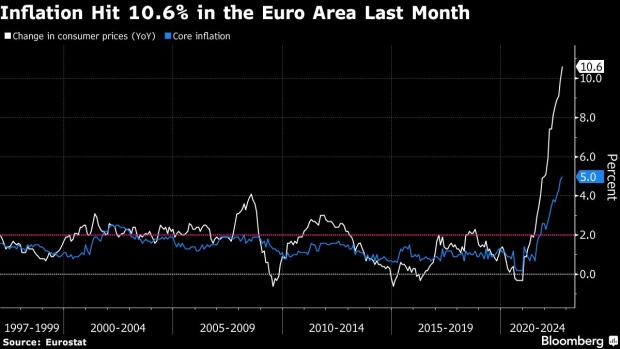Nov 18, 2022
Lagarde Says Rates to Rise More, May Need to Become Restrictive
, Bloomberg News

(Bloomberg) -- European Central Bank President Christine Lagarde said interest rates may need to be lifted to levels that restrict economic expansion in order to drive down inflation that’s rocketed to more than five times the official target.
Lagarde said Friday that the “risk of a recession” has increased, but that a downturn on its own won’t be sufficient to tame soaring prices. Having already delivered the most aggressive monetary tightening in its history, the ECB is expected to raise borrowing costs to 2% or more next month from 1.5% now.
“We expect to raise rates further -- and withdrawing accommodation may not be enough,” Lagarde said in a speech in Frankfurt. “Ultimately, we will raise rates to levels that bring inflation back down to our medium-term target in a timely manner.”
ECB officials are maintaining that borrowing costs must continue rising to counter the fastest inflation since the euro was introduced more than two decades ago. But after back-to-back hikes of 75 basis points, appetite for such jumbo moves may be waning, especially as forecasts point to a winter recession for the 19-nation euro zone.
Indeed, initial discussions suggest a half-point step may be more likely at the final decision of the year on Dec. 15, so long as this month’s inflation reading doesn’t produce another upside surprise, according to people with knowledge of the matter.
Inflation in the 19-nation euro zone, which hit 10.6% in October, will probably stay “elevated” for months, Vice President Luis de Guindos said this week. Similar to Lagarde, he said the weakening economic backdrop, driven by Russia’s war in Ukraine and the subsequent energy crisis, won’t curb prices by itself.
“Inflation in the euro area is far too high,” Lagarde said. “Historical experience suggests that a recession is unlikely to bring down inflation significantly, at least in the short run.”
The ECB is set to start shrinking its balance sheet next year. The president reaffirmed key principles that will apply for the process known as quantitative tightening will be laid out in December.
“It is appropriate that the balance sheet is normalized in a measured and predictable way,” Lagarde said.
(Adds QT comment in final paragraph)
©2022 Bloomberg L.P.






